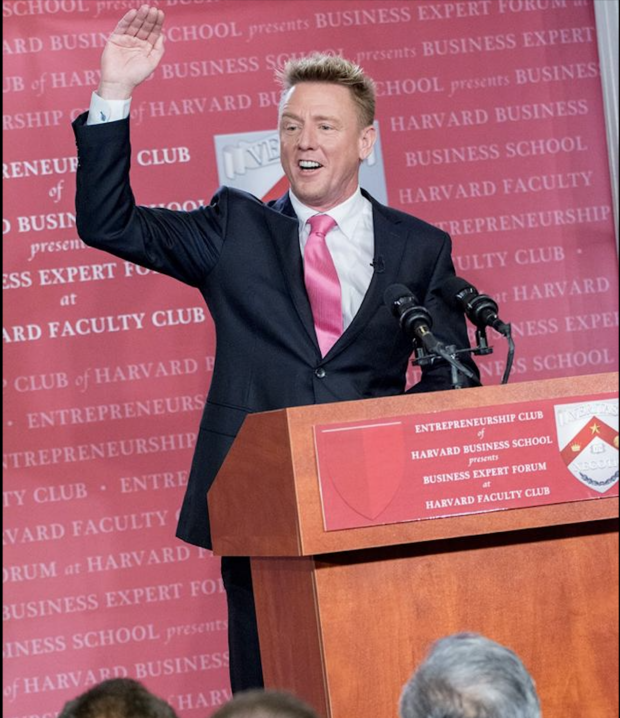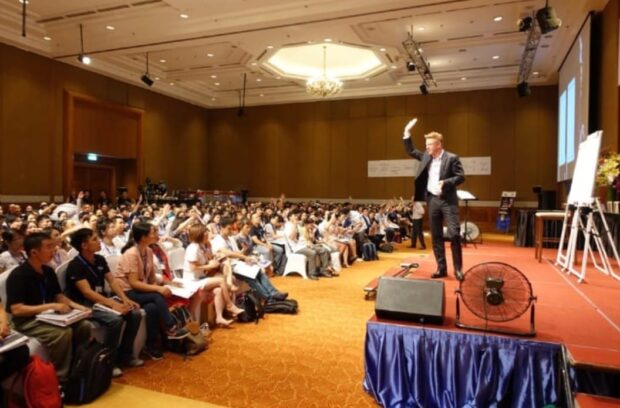Harvard speaker reveals 5 key reasons for global business failures and automation’s preventative power

With a grand yet measured focus on dynamic existing businesses around the world, John Rankins says that his objective is “to give business owners a competitive advantage — using technology — to drive sales and performance.” This can be achieved, Rankins says, through his patent-pending automated software called “The Sales Machine.”
Rankins is an award-winning speaker at Harvard Business Faculty and has trained over 10,000 sales people from a variety of industries.

But the crux of Rankins’ international success has been widely attributed to his “Sales Machine” software, which he enthusiastically claims “empowers companies through increased sales, a quantifiable enhancement in performance, and retention of customers.”

According to Rankins, there are five primary reasons behind the general failure of businesses and why their people might be underperforming:
1. Lack of Sales
In a report by Forbes, it’s highlighted that 38% of small businesses close their doors due to insufficient capital. The journey from startup to profitability is costly, and many businesses face a daunting challenge in amassing enough capital to navigate this initial phase.
Therefore it is imperative to establish and maintain a robust capital reserve or have reliable access to funding sources. This ensures not only the survival of your business but also paves the way for sustainable growth.
2. Lack of Marketing
A striking 42% of businesses meet their demise within the first five years due to a lack of market demand. Furthermore, marketing effectiveness, or the lack thereof, contributes to a 14% failure rate, emphasizing the significance of marketing strategies in business success, as stated in a report by Inc.com.
However, it’s essential to acknowledge that the existence of demand doesn’t guarantee success.
3. Lack of Accountability
The phenomenon of “quiet quitters” is a concerning trend, defining those who are disengaged at work, ultimately leading to underperformance. According to Gallup, this group encompasses at least 50% of the workforce.
This disengagement isn’t isolated; it has implications for both employees and their managers. As revealed in a report by Harvard, 82% of managers acknowledge having “limited to no” ability to effectively hold their team members accountable. In addition, 91% of employees recognize the urgent need for their companies to enhance their leadership in terms of accountability. Consequently, 69% of employees feel that they’re not reaching their full potential at work.
Given this scenario, the role of accountability among managers becomes pivotal. They must strike a balance between engaging their team members in meaningful conversations and avoiding the pitfalls of micromanagement. When done skillfully, these conversations can play a crucial role in reducing disengagement and the risk of employee burnout.
4. Lack of Retention
According to Gallup, a staggering 76% of employees admit to experiencing job burnout symptoms. This isn’t just a number; it represents a significant portion of the workforce grappling with issues like exhaustion, reduced job satisfaction, and a general sense of disengagement.
For managers and business owners, addressing this retention issue is not just a matter of avoiding a high turnover rate but also ensuring that employees are genuinely committed to their roles. It’s about creating an environment where employees are not just present but are also actively contributing their best efforts.
5. Lack of Training
In the latest McKinsey report published by Fortune, another 4.3 million workers quit their jobs in 2022 Q2—while 40% of people in the workforce are still very unhappy with their jobs and looking for new opportunities. The most common reason they are leaving is a lack of career development opportunities, according to Gartner.
This situation emphasizes the critical importance of focusing on both retention and career development. Employees must be able to envision a clear and attainable career path within their current organization.
“The solutions to the five above mentioned issues” Rankins says, “can be found holistically in our Sales Machine software. It integrates our S.M.A.R.T. patent-pending framework — Sales, Marketing, Accountability, Retention and Training. By aligning these critical aspects, it creates a powerful synergy that drives business excellence, scalability and sustainability.”
Rankins is also launching a new business podcast, also called ‘The Sales Machine’. In it, he talks about his award-winning software — along with a variety of other business- and non-business-related topics — with the likes of Blair Singer, Vikas Malkani, James Skinner and Dr. Alan Barnard. Rankins also intends to have finance and tech titans Robert Kiyosaki, Gary Vaynerchuk and Steve Wozniak as guests on future dates.
His first episode is a tribute to the late Chet Holmes — a mentor to Rankins and legendary advisor to Fortune 500 companies like Apple, Merril Lynch, AT&T, T Mobile and Panasonic, having helped significantly advance several multi-billion-dollar corporations before passing.
“I learned from Chet,” says Rankins, “So I intend on honoring him by allowing people to understand his psychology. His methodology is built into my technology.”
Rankins won the Most Innovative Software Award at the 2021 Intercon USA.
The Sales Machine podcast launches today, October 30th, and will be available on YouTube, Spotify and Apple.